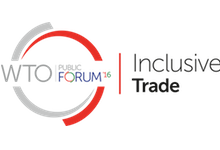Digital trade for digital economy
29 Sep 2016 15:30h - 17:00h
Event report
[Read more session reports and live updates from the 2016 WTO Public Forum.]
This session, organised by the Permanent Mission of Japan to the World Trade Organization (WTO), addressed the possible role of the WTO in digital trade, and how the organisation could carry out that role to unleash the potential of the digital economy.
Ambassador Junichi Ihara of the Permanent Mission of Japan to the WTO, opened the session, and emphasised the need to create a common awareness among WTO members about the importance of free flow of data, and to tackle the core issues of e-commerce in the future.
Jonathan T. Fried, Ambassador and Permanent Representative of Canada to the WTO, moderated the session and introduced the panellists. Cody Ankeny, Manager of Global Policy at the Information Technology Industry Council, was the first speaker, and he argued that decision-makers should first understand the technology they are regulating – the Internet, to understand how data localisation affects businesses.
Torbjörn Fredriksson, Officer in Charge of the Science, Technology and ICT Branch at the United Nations Conference on Trade and Development (UNCTAD), pointed at the importance for businesses to have an online presence, as without it, ‘you will often be invisible’. At the same time, there is still an important digital divide, as ‘75% of Africans do not use the Internet’. Fredriksson shared Ankeny’s vision that there needs to be an understanding of both technology and trade policy to come up with the right solutions.
Javier Lopez Gonzalez, Trade Policy Analyst at the Trade and Agricultural Directorate of the Organization for Economic Co-operation and Development (OECD), reassured the participants that ‘trade still works largely the same’ and that ‘digital merely brings to light things that were previously hidden away’. Gonzalez pointed to the need to take a step back, and look at the ‘how’, ‘what’ and ‘who’ to better understand digital trade. At the same time, he emphasised worrying trend of increased number of measures taken by countries that limit digital trade, such as cross-border data flow restrictions and local storage requirements.
Makoto Yokazawa, Vice chairperson of the Internet Economy WG, The Japanese Business Federation, took a more in-depth look at the harms of data localisation requirements, by relating them to three cases from Japanese businesses. He expressed the concern that with data localisation, business will be negatively affected for all three companies.
After these short introductions, Fried asked each participant a set of questions, leading to a dynamic discussion. Asked about the role of the WTO, Ankeny explained that information is not a national entity, and that data flows need to be discussed at the international level. As cross-border data flows are essential for every international business, the WTO has an important role to play. Although there are challenges, there should be an effort towards a multilateral commitment.
Fredriksson emphasised that there should be more knowledge about the concerns behind the feared barriers to e-commerce, ad how they can best be addressed without disrupting trade. He argued that although the WTO has a role to play, it is not the only institution in this field. The institutions that address the topic of digital trade communicate too much in silos; yet, the Internet is relevant for everyone.
Gonzalez argued that if these things are not being dealt with within the WTO, they will be more and more arranged in regional trade agreements, potentially leading towards a compartmentalisation of digital trade regimes across regions. Therefore, he pleaded for a higher level of understanding and harmonisation, even though there are still large differences among countries.
The need for a ‘multistakeholder’ framework was mentioned a couple of times, and Makoto pointed out that the WTO is not a multistakeholder institution. Instead, it might be better to apply an ‘orchestration model’, ‘orchestrating the different actors and encouraging everyone to perform best in their own capacity’.
The discussion was then opened to the participants, and several topics were addressed, such as the problem of the uncertainty of the business climate if there is no regulatory environment in place; the international legal validity of electronic transactions; and women’s participation in the digital economy.
The session was closed by Ambassador Ihara, who stressed that the subject should be narrowed down and the core issues identified, to have a more concentrated discussions. He furthermore argued that there is a need for a multidisciplinary discussion with other experts to have a rich and valid understanding on the topic of e-commerce.
by Barbara Rosen Jacobson
Related topics
Related event

